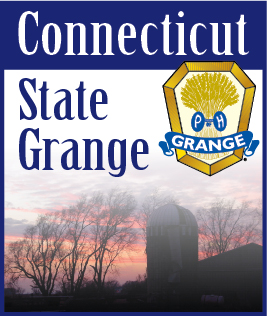| APRIL 5, 2014 -- The Connecticut Legislative Session is in full swing with many legislative committees actively working on many bills. So far the Grange has testified on three bills and given its support to a few more. We have testified on RB 70 land preservation proposals for the Department of Energy and Environmental Protection, RB 5419 concerning the preservation of the Savin Farm in Lebanon and RB 5288 concerning a study of the winter road treatments. We also supported but did not testify on RB 66 concerning Wood Burning Outdoor Furnaces which forbids the burning of chemically treated wood in the furnaces, RB 65 which defines the definition of “Connecticut Grown” and RB 69 concerning the Farmland Restoration and Vacant Public Lands Program.
We testified on RB 70 Concerning the Preservation of Lands Under the Control of the Department of Energy and Environmental Protection and the Department of Agriculture. The state owns many acres of prime farmland that is under the control of the above agencies. The bill seeks to preserve such land as open spaces or to allow agricultural or recreational activities. Other state agencies also own many acres of prime land such as the Mansfield Training School and the land owned by the Department of Corrections. The Grange recommended that other state agency’s lands also be included in the preservation program.
HB 5419 concerns the preservation of the Savin Farm in Lebanon which is already owned by the State. This would authorize the State to grant a farmland preservation easement to a suitable nonprofit land preservation organization similar to the State easements on many privately owned farms. This easement would insure that the State would never convert the Savin farm to any use other than agriculture.
One issue that has become a big topic this year is RB 5288 concerning the use of chemical treatments on our roads in winter weather. There has been quite a bit of discussion concerning the use of these treatments and the impact it is having on roads, bridges and vehicles. The bill that is being proposed directs the Commissioner of the Department of Transportation to conduct an analysis of the corrosive effect that these treatments are having on roads, vehicles and the environment. He is to report back by January 1, 2015 with his findings, conclusions and recommendations. This is to also include the possibility of using rust inhibitors in the treatments.
The Grange has been for years advocates for roads and highways and after discussing this issue with the Legislative Committee and the Executive Board we felt that the Grange should support such a study. There have been reports of vehicle frames, brakes and brake lines rusting out as well as metal components of our bridges. One person giving testimony that day was a student at Northwestern Regional 7 and a current FFA member. She has been doing her FFA project on the impact these treatments are having on vehicles and had some very convincing material that she shared. Another speaker noted that a couple of bridges that had to be shut down that were no longer safe for traffic use in the northwest corner of the state due to weakening structures. Ask Russ Gray what damage he is seeing underneath the school buses in Sterling.
It has been reported that other states such as Colorado have included a rust inhibitor in their treatment mix to reduce the rust damage caused by these chemicals. We understand that the State of Connecticut decided to not include this additional chemical to keep costs down. How much damage is being done to the state trucks with the treatment and how much more will it cost the state to keep up on the maintenance of our state fleet? There also has been some concern expressed about the possible environmental damage caused by these inhibitors. The study is supposed to address these concerns. |
